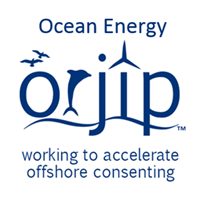Tidal Range in Wales: Critical Environmental Evidence Gaps and How to Address Them- Workshop Report
March 2022
Workshop report from the Marine Energy Wales workshop.
Information Notes, Welsh Government Science and Evidence Advisory Group
July 2022
A series of technical, topic specific Information Notes aimed at the wave and tidal stream sector. These have been collaboratively produced by the Welsh Government Science and Evidence Advisory Group and coordinated by ORJIP Ocean Energy to provide a shared understanding of how the best available science and evidence is applied to support consenting in Wales.
The ambition is for the Information Notes to facilitate early discussions between applications and Natural Resources Wales, support marine licence applications and any potential monitoring and mitigation activities to ensure these are robust, proportionate and focused on the most significant potential impacts and interactions between the marine environment and marine renewable energy projects.
The Information Notes do not reflect a legal position and should not be interpreted in this way. This series of Information Notes is intended to communicate the current perspectives of a range of stakeholders involved with the marine renewable energy industry in Wales on various consenting issues. These perspectives may change as and when new evidence and information becomes available.
De-risking consenting of tidal energy arrays – are we nearly there yet? 
Workshop report from the Marine Energy Wales online side event.
Wave and Tidal Stream Critical Evidence Needs
The Critical Evidence Needs document follows on from the ORJIP OE Forward Look and sets out the critical outstanding evidence needs for wave and tidal stream energy in the UK, grouped into ten strategic topics. The ten topics provide an overall perspective on research priorities and their importance for effective decision-making, by linking research needs to the practical application of outputs. Presenting the critical evidence needs in this way is intended to help deliver solutions-orientated research with high practical impact for more effective decision-making by Consenting Authorities.
ORJIP Ocean Energy would like to actively encourage Network participants to express their interest in progressing research or studies to address any of the critical evidence needs identified. Whilst ORJIP Ocean Energy cannot directly fund research, the Secretariat works actively to identify and influence funding opportunities and can support and facilitate interested organisations or consortia in developing research proposals. Any updates regarding recently completed, ongoing or planned research relevant to the critical evidence needs would be welcomed at any time.
Sharing Environmental Monitoring Data 
The report on Sharing Environmental Monitoring Data presents the key challenges and opportunities in sharing environmental data within the wave and tidal energy sector from an industry perspective.
Review of underwater video data collected around operating tidal stream turbines
A project entitled “Review of underwater video data collected around operating tidal stream turbines” was undertaken by Aquatera on behalf of NatureScot (the operating name of Scottish Natural Heritage). This review was conducted with the aim to: i) ensure experience to date with regard to the design and implementation of environmental monitoring programmes is captured, ii) inform the development of proportionate future monitoring plans and to help reduce risk and costs wherever possible, and iii) establish what can be learned regarding near-field behaviour of ecological receptors.
The full publication can be accessed here.
1.1 METADATA CATALOGUE 
Information about environmental impact monitoring data from tidal stream energy projects around the world to date has been gathered to create a comprehensive global metadata catalogue. This catalogue can be used to help inform the design of future monitoring and research projects and helps raise awareness of the extent and types of environmental impact monitoring data collected to date by the sector.
1.2 PROTOCOL 1: MONITORING SYSTEM REVIEW 
Two protocols have been developed to standardise the approach to data collection and analysis and provide a framework that allows comparison of data across discrete datasets. Protocol 1 is a technical protocol for assessing the effectiveness of monitoring techniques, equipment and processes.
1.3 PROTOCOL 2: ENVIRONMENTAL ANALYSIS OF UNDERWATER VIDEO DATA 
Protocol 2 supports the standardisation of underwater video data review and analysis of near field behaviour of ecological receptors around tidal stream turbines.
Forward Look
The Forward Look includes a prioritised list of strategic research projects to address key EIA/HRA issues and sets out the purpose, required timing and broad scope of the research projects necessary to meet ORJIP Ocean Energy’s overall aim.
The objective of the Forward Look is to inform the focus of ORJIP Ocean Energy; ensuring that research is focused on priority consenting EIA/HRA issues for the wave and tidal sectors, projects are coordinated to avoid duplication of effort, and key information and data gaps are addressed. The Forward Look builds upon the work previously undertaken by Aquatera; incorporating evolving sector needs and consideration of recent completed research as well as planned and ongoing research. It should be noted that whilst the previous Aquatera report focused on the wave and tidal current sectors, the Forward Look also includes tidal range.
The intention is for the Forward Look to be updated and reissued periodically as the programme progresses.
Find The Forward Look (2017) here 
Supporting good practice in consenting for tidal stream and wave technologies in Wales
Report by ORJIP Ocean Energy investigating opportunities for marine licensing in relation to wave and tidal stream in Wales.
Project Brief
ORJIP Ocean Energy Programme Brief
